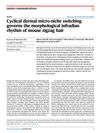48 citations,
June 2000 in “Japanese Journal of Cancer Research” Dimethylarsinic acid speeds up skin tumor growth in certain mice.
 47 citations,
October 1989 in “Circulation Research”
47 citations,
October 1989 in “Circulation Research” The study explains how minoxidil sulfate causes vasodilation in rabbits by opening potassium channels and inhibiting calcium channels.
 44 citations,
July 1990 in “Journal of the American College of Cardiology”
44 citations,
July 1990 in “Journal of the American College of Cardiology” Captopril reduces heart mass, while minoxidil has opposite effects and side effects.
 40 citations,
January 2017 in “Intestinal Research”
40 citations,
January 2017 in “Intestinal Research” Genotyping for NUDT15 p.Arg139Cys can help predict thiopurine side effects in Japanese IBD patients.
37 citations,
August 2011 in “Journal of Bone and Mineral Research” A girl had rickets due to a gene mutation affecting vitamin D response.
33 citations,
December 2014 in “Journal of the European Academy of Dermatology and Venereology” Lichen planus is linked to several autoimmune diseases.
 29 citations,
June 2018 in “Scientific Reports”
29 citations,
June 2018 in “Scientific Reports” 15-lipoxygenase helps keep skin healthy by reducing inflammation.
 28 citations,
January 2004 in “British Journal of Pharmacology”
28 citations,
January 2004 in “British Journal of Pharmacology” Minoxidil protects heart and improves recovery.
 24 citations,
January 2015 in “International Journal of Trichology”
24 citations,
January 2015 in “International Journal of Trichology” Early balding in young Indian men may indicate a higher risk of metabolic syndrome and potential heart disease.
 22 citations,
May 2021 in “Nature Communications”
22 citations,
May 2021 in “Nature Communications” Tissue stiffness affects hair follicle regeneration, and Twist1 is a key regulator.
21 citations,
April 1995 in “Mayo Clinic Proceedings” Leydig cells can cause testosterone-secreting adrenal tumors in women.
20 citations,
December 2021 in “Journal of the American Academy of Dermatology” Continuous treatment with ritlecitinib and brepocitinib is needed to maintain hair regrowth in alopecia areata.
 19 citations,
March 2018 in “Journal of Investigative Dermatology”
19 citations,
March 2018 in “Journal of Investigative Dermatology” The gene Msx2 is crucial for hair follicle regeneration during wound healing.
 18 citations,
February 2022 in “Cell Death Discovery”
18 citations,
February 2022 in “Cell Death Discovery” ECM1-modified stem cells can effectively treat liver cirrhosis.
18 citations,
January 2000 in “Journal of Adhesion Science and Technology” Modified artificial hair with collagen improves tissue adhesion and is safe for long-term use.
17 citations,
April 2021 in “Frontiers in Pharmacology” Activating Nrf2 can help protect against hearing loss.
16 citations,
April 2016 in “Medicine” Early treatment and regular check-ups are crucial for lupus patients to prevent progression and improve outcomes.
13 citations,
December 2001 in “Journal of Investigative Dermatology” Overexpressing ornithine decarboxylase and v-Ha-ras in keratinocytes leads to invasiveness and malignancy.
11 citations,
April 2014 in “Journal of Clinical Virology” Older age, pre-existing skin conditions, cirrhosis, and pegylated interferon use increase the risk of skin issues during hepatitis C treatment.
10 citations,
January 2018 in “International Journal of Trichology” Mesalazine may help treat extensive alopecia areata effectively.
9 citations,
January 2019 in “International Journal of Trichology” Combining calcipotriol with mometasone is more effective for treating alopecia areata than using mometasone alone.
8 citations,
January 2020 in “Indian Dermatology Online Journal” PRP works faster and is a safe alternative to steroids for treating alopecia areata.
8 citations,
January 2017 in “Acta Dermato Venereologica” Thorough clinical examination is crucial for diagnosing unusual alopecia.
8 citations,
January 2015 in “Genetics and Molecular Research” Certain gene variations increase the risk of alopecia areata in Koreans.
7 citations,
March 2022 in “International Journal of Molecular Sciences” FGF21 can help reduce skin inflammation caused by C. acnes.
 6 citations,
February 2023 in “Plant and Soil”
6 citations,
February 2023 in “Plant and Soil” Bacillus subtilis strain WM13-24 helps plant root growth through volatile compounds.
 6 citations,
December 2021 in “Scientific Reports”
6 citations,
December 2021 in “Scientific Reports” Inhibiting class I HDACs helps maintain hair growth ability in skin cells.
 5 citations,
July 2023 in “International Journal of Women’s Dermatology”
5 citations,
July 2023 in “International Journal of Women’s Dermatology” Anifrolumab significantly improved skin lesions and hair regrowth in severe discoid lupus.
 4 citations,
August 2023 in “Nature Communications”
4 citations,
August 2023 in “Nature Communications” Mouse zigzag hair bends form due to a 3-day cycle of changes in hair progenitors and their environment.
 4 citations,
March 2022 in “Journal of The American Academy of Dermatology”
4 citations,
March 2022 in “Journal of The American Academy of Dermatology” Direct-to-consumer teledermatology is not effectively reaching underserved populations due to language, technology, and insurance barriers.













